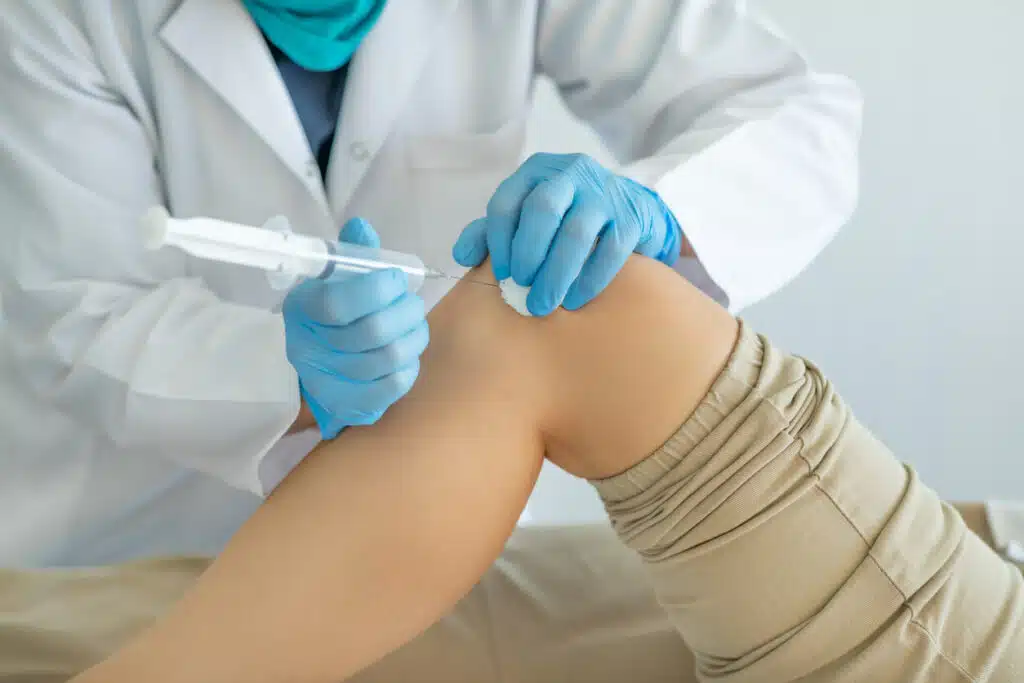
Knee pain can significantly impact a person’s quality of life, making it difficult to perform daily activities. Fortunately, knee injections can help provide relief for severe cases. There are several types of knee injections available, including corticosteroids, hyaluronic acid, and PRP.
In this article, we will look at these options to help you understand what they are and how they work.
Corticosteroid Injections
Corticosteroid injections are commonly used to treat knee pain caused by inflammation.
The injection contains a synthetic version of cortisone, which helps reduce inflammation and pain in the area.
Corticosteroids are effective in reducing inflammation and relieving pain, but the effects are temporary, lasting between 2-3 months.
There are some rare side effects to keep in mind and discuss with your doctor, such as:
- Joint infection
- Nerve damage
- Thinning of the skin and bones around the injection site
Hyaluronic Acid Injections
Hyaluronic acid injections are also known as viscosupplementation. These injections contain a substance similar to the natural fluid found in joints.
These injections help lubricate the joint, reducing friction and pain. They may also reduce inflammation.
Keep in mind that these injections may not be effective for all patients.
Platelet-Rich Plasma (PRP) Injections
PRP injections are an emerging treatment for knee pain. The injection contains a concentrated amount of platelets and growth factors collected from the patient’s blood.
PRP injections may reduce pain more effectively than hyaluronic acid injections at six months.
PRP injections are also promising for relieving pain and improving knee function.
When You Might Benefit from Knee Injections
A healthcare professional may recommend knee injections if you are experiencing knee pain that is affecting your daily life.
Here are some situations where the treatment may be beneficial:
Osteoarthritis
Osteoarthritis is a degenerative joint disease that affects millions of people worldwide.
It occurs when the cartilage in your joints breaks down. This leads to the bones rubbing against each other and causing friction, inflammation, and pain.
Rheumatoid Arthritis
Rheumatoid arthritis is an autoimmune disorder that causes inflammation in the joints. It can lead to joint damage, swelling, and pain.
Tendinitis
Tendinitis is inflammation of a tendon, which connects muscle to bone. It can cause pain and stiffness in the joint and is common in the knee.
Ligament Injuries
Ligament injuries, such as an ACL tear, can cause pain, swelling, and instability in the knee joint.
When to Visit a Knee Doctor for Joint Pain
Knee pain can significantly affect your quality of life, making it difficult to perform daily activities. While knee pain is common, it’s important to know when to seek medical attention from a knee doctor.
Here are some situations where you should seek medical attention:
Intense or Persistent Pain
Seek medical attention from a knee specialist if you experience intense or persistent pain in your knee joint.
They can evaluate your symptoms and determine the underlying cause of your pain.
Intense pain that lasts more than a few days can be a sign of a serious injury or condition that requires prompt treatment.
Swelling or Redness
Swelling or redness around the knee joint can be a sign of inflammation or infection. If you notice swelling or redness, it’s important to see a knee specialist, so they can:
- Evaluate your symptoms
- Determine if further medical treatment is necessary
Difficulty Walking or Standing
Difficulty walking or standing may be a sign of a serious knee injury or condition that requires prompt treatment.
If you are experiencing difficulty walking or standing due to knee pain, a knee specialist can:
- Assess your mobility
- Determine the underlying cause of your pain
Limited Range of Motion
A limited range of motion can be a sign of an injury or condition that requires prompt treatment.
A knee specialist can evaluate your symptoms and recommend the best course of treatment to improve your mobility.
Painful Knee Treatment Near You in Boyton Beach, FL
If you are experiencing knee pain that affects your daily life, it’s essential to seek medical advice from a qualified healthcare professional. Knee injections can be an effective treatment option, but they may not be suitable for everyone.
Depending on your symptoms, medical history, and other factors, your doctor may recommend a specific type of injection. It is important to fully discuss with your doctor the benefits and risks of each treatment option first.
Do you need knee pain treatment near you in Boynton Beach, FL? If so, you can rely on Personalized Orthopedics of the Palm Beaches. Under the care of our highly skilled and compassionate orthopedic team, you can rest assured you will receive the best services.
You may reach our helpful staff today at (561) 733-5888, Ext. 9, so we can assist you. You can also submit an online request form to book a visit with the best knee doctor in Boynton Beach.
We look forward to serving you!

